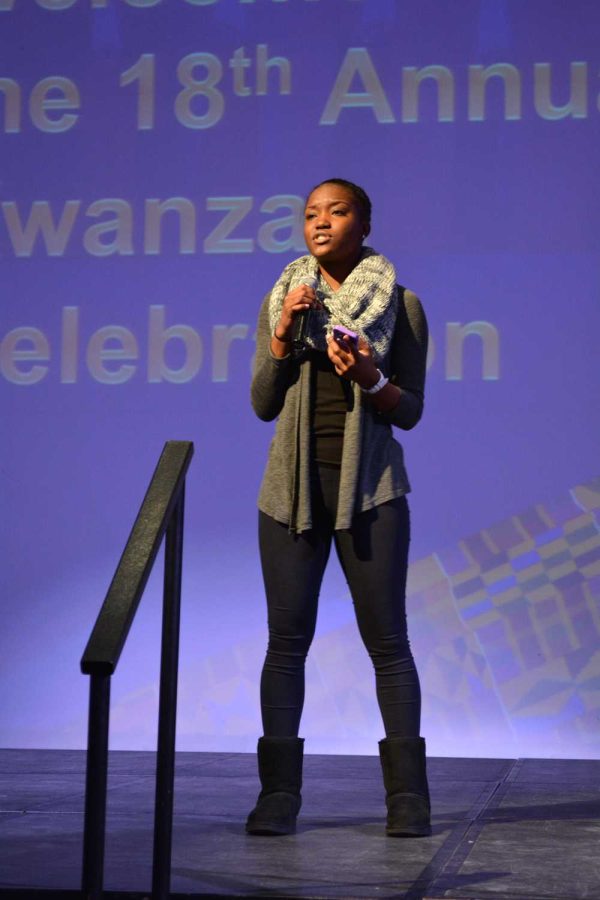Before third year ethnic studies major Gregory Harrison came to the University, he didn’t know much about Kwanzaa. He attended the 16th annual Kwanzaa Celebration during his first year and has been celebrating it every year since.
Now the president of the Black Student Union, Harrison helped organize the celebration that introduced him to the holiday, which is celebrated from Dec. 26 to Jan. 1.
The 18th Annual Kwanzaa Celebration, sponsored by the Black Student Union and the Office of Multicultural Affairs, took place in room 101 of Olscamp Hall Tuesday night.
African American activist Maulana Karenga started the holiday in 1965 as the first African American holiday. The name Kwanzaa comes from a Swahili phrase meaning “first fruits of the harvest,” and is a way for African Americans to celebrate their heritage.
“This is an opportunity to connect with a part of our culture that many of us didn’t get a chance to learn about prior to college,” Harrison said. “It’s a chance to come out and learn something new.”
Although Kwanzaa takes place over the course of seven days, Associate Director of the Office of Multicultural Affairs, Sheila Brown, said the two organizations did their best to replicate as much of the holiday as possible.
“Since we’re limited with our time here at the University, we can only celebrate it for one day,” Brown said. “So we try to pack everything in one day.”
Several Kwanzaa symbols, including ears of corn and decorative mats, garnished the room as the audience of about 100 people filled the space. There are seven symbols, and each represents one of the seven principles celebrated during Kwanzaa: unity, self-determination, responsibility, cooperative economics, purpose, creativity and faith.
The Kwanzaa celebration began as members of the Black Student Union executive board lit the seven candles on the kinara and explained what principle each candle represents.
The rest of the event included singing, dancing and poetry, and focused on “Karamu,” an aspect of the holiday meaning “festival” or “celebration.”
“We focus on the entertainment portion of it as well as keeping the seven principles,” Brown said. “It allows students an opportunity to really showcase their talent.”
Acts at the celebration included a poem by Norman Willis, a dramatic reading and dance expression by Kat Thurman and Jacquil Tilly, choir songs by The Voices at BGSU and the Black Culture Club of BG City Schools, a performance by the Double Dutch Rope Twisters and dances from the Africana Dance Troupe and Element Dance Team.
Students were also welcome to come to the stage and showcase their talents without registering.
Sophomore Psychology major Khala Pace used to celebrate Kwanzaa and said the celebration was a good way to refresh herself on the holiday and experience a condensed form of it in the time allotted.
“I really liked how there was a lot of different talent, and then the history of Kwanzaa,” Pace said, “because I feel like a lot of people don’t really know what Kwanzaa is and where it came from.”
Harrison said that he hopes the event helped educate students about the holiday, noting that people who celebrate it can still celebrate Christmas and other holidays.
“It’s really an opportunity to expand your mind culturally,” Harrison said.
Although Brown said many students don’t celebrate the holiday annually, she called the holiday a time for support between the community, family and the campus as a whole. She considers the event a learning experience for everyone.
“Being unified as a community is one of the things that is really stressed during this time,” Brown said. “Those principles are something that not just African Americans, but anybody can apply to their lives.”














